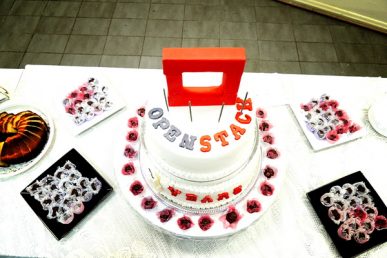Throughout the month of July, we’re featuring user groups from across the world to learn about how each group operates. Today, we hear from Australia and Kenya.
## Australia
*The Australia user group spans several cities in Australia including Brisbane, Hobart, Melbourne, and Sydney. It was started in October of 2011 via a Google Group and a nearly simultaneously Meetup. The group is very active to this day and persists over pints beer, food, and good conversation. To learn more about the group, visit their [Meetup Group](http://www.meetup.com/Australian-OpenStack-User-Group).*

##### 1) How long has the Australia user group been around? Describe how it formed.
We started in October 2011. Tom started a Google group and Tristan started a Meetup group within days of each other. Very soon after we discovered each other’s existence and the first two physical get togethers took place in [Sydney](http://www.meetup.com/Australian-OpenStack-User-Group/photos/4950782/79691722/) and in [Melbourne](http://www.meetup.com/Australian-OpenStack-User-Group/photos/5479972/#87075812) in late 2011 and early 2012. Both were great nights and we had some early contributing vendors speak. Much beer and food were consumed and many long-time friendships have endured since.
##### 2) Describe a typical user group meeting.
They have varied quite a lot since we began and as we learnt how to run them, and now the format varies quite a lot across the country since local members have taken on organizing roles in their respective cities. In common is that they are mostly very casual affairs, always with beer and food and plenty of time for everyone to chat.
##### 3) How do the members of your user group collaborate outside of meetings?
Our group is somewhat unusual in that it spans multiple cities. Australia is about the same size as the USA, but with vastly lower population density, so we stick organisations together at a national level when it makes sense, and at a city-level when that makes sense. This means we can have massive OpenStack turnouts at popular events like [Linux.conf.au](http://linux.conf.au/) or [Pycon Australia](http://2014.pycon-au.org/), which are easily communicated across the entire group. We’re lucky to have an increasing number of developers (including several core reviewers!) who participate, and you can generally find friendly Australians posting on the upstream mailing lists.
So far we have very active chapters in Brisbane, Canberra, Hobart, Melbourne and Sydney. We have had meets in Adelaide and Perth but we have a little more work to do there to grow the local interest.
It’s also not uncommon to find smaller groups of members gathering for a quick [Schooner](http://en.wikipedia.org/wiki/Beer_in_Australia#Beer_glasses) at their local whenever the weather gets warm.
##### 4) What’s one piece of advice you would give to new users?
Come along and ask questions, and if you’re a bit shy don’t be. Have a few beers and let fly! As beginners, it’s likely other beginners have similar questions or are in the same predicament. We do try to have regular beginners nights where we cover off all the big questions that people are likely to ask, but active participation will get you further, faster.
##### 5) What do you wish was powered by OpenStack? If you could build anything with OpenStack, what would it be?
The [Big Banana. the Big Pineapple, the Big Prawn, the Big Mango](http://en.wikipedia.org/wiki/Australia%27s_big_things), and of course, a beer factory somewhere.
##### 6) What is the unique opportunity for OpenStack in your region?
Like beer pricing in many parts of the world, data sovereignty is also an issue here. Australian government privacy laws are very strict, and for certain industries, even the state-level boundaries can be an issue.
On a technical level, Australia’s connection to the global internet, while using high bandwidth submarine cables, is relatively high latency. Due to this, there are not insignificant performance benefits for locating applications closer to the user edge compared with datacentres in other continents.
##### 7) What’s something your user group will do to celebrate OpenStack’s 4th birthday?
We are drinking beers, it’s what Australians generally like to do.
## Kenya
*The Kenya user group, based in Nairobi, has been around for just over a year with the goal making a business case for OpenStack, sharing knowledge and user experiences, and solving problems to make it all work. Visit their Meetup group [here](http://www.meetup.com/OpenStack-Nairobi). *

##### 1) Describe a typical use group meeting.
Our Meetups take place on the last Tuesday of every month. We kick off the Meetups with new attendee introductions followed by the regulars (putting faces to emails and Meetup handles). The speaker then starts off with his/her presentation followed by a Q&A session afterwards.
Prior to the Meetup taking place, the group organizer should have found a speaker with a relevant presentation topic and communicated the same to all other members.
##### 2) How do the members of your user group collaborate outside of meetings?
Mainly via email and meetup.com for announcements
##### 3) What are the most important questions about OpenStack that are burning in your user group’s mind?
- 1) Benefits of transitioning to OpenStack from current systems (e.g. moving to swift & cinder for backups)
- 2) Deployment methods/techniques
- 3) Underlying infrastructure/hardware organization
- 4) Metering/billing
##### 4) What advice you would give to new users?
- Don’t try to learn all of OpenStack at once. Take it in one project at a time.
- Pick the component that uses technologies that you are most familiar with and roll with it.
- Don’t hesitate to ask for help on the http://ask.openstack.org forum, the freenode IRC channels, or the mailing lists, but before you consume the other user’s time and effort, check if your question hasn’t already been in answered in one of the many OpenStack Q&A databases out there.
- Spread out to the other projects once you “know the ropes”.
- Be ready to customize and contribute back.
- Join an OpenStack user group in our region or start one if there’s none.
- Spread the word!
##### 5) What have been the biggest benefits to your user group members in using OpenStack?
- Knowledge gain (cloud related)
- Sharing of usage experiences (including the gotchas)
- Networking…..getting to know other stackers
- Free consultancy 🙂
##### 6) What do you wish was powered by OpenStack? If you could build anything with OpenStack, what would it be?
During my undergrad, i used to host some of my school projects on a VM hosted a public cloud in Europe.Poor connections from this side of the world to my VM’s data center frustrated my efforts with high latencies.
It would be great to see learning institutions here setting up cloud infrastructure (powered by OpenStack of course) so that students don’t have to go through that experience. If we could build anything with OpenStack, a solution to the above problem would be it! 🙂
##### 7) What is the unique opportunity for OpenStack in your region?
There isn’t as much competition from proprietary clouds as in other regions. In our region, cloud computing budgets tend to be lower than in other parts of the globe. With OpenStack, public cloud companies are able to provide cloud services at affordable prices. The cloud market here is still in its early stages and it is yet to be decided which stack takes first prize of dominance.
We would like to make sure OpenStack does 🙂
##### 8) What’s something your user group will do to celebrate OpenStack’s 4th Birthday?
We’ll present an overview of Openstack from inception to today, give away commemorative #openstack4bday merchandise t-shirts to group members and have a beer party with panel discussion (probably talk battle) regarding OpenStack.
///
If you’re interested in participating in Superuser’s User Spotlights this month, please email us at [[email protected]](mailto:[email protected]). We’d love to learn more about your group!
Image credit: “Downtown Nairobi, view from the Computer Pride office” by Jan Videren
- Musings and Predictions from Superuser’s Editorial Advisors - January 29, 2015
- Kilo Update: Trove - January 9, 2015
- Kilo Update: Ceilometer - December 19, 2014

)










